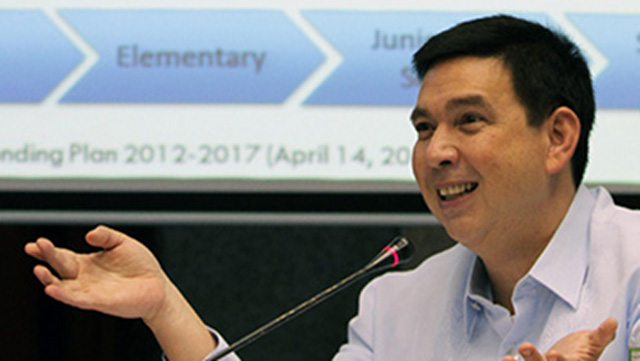SUMMARY
This is AI generated summarization, which may have errors. For context, always refer to the full article.

MANILA, Philippines – Responding to what he calls “social media chatter” that barangays should stop getting shares of the internal revenue allotment (IRA), Senate President Pro Tempore Ralph Recto announced on Friday, August 2, that the so-called first responders will in fact get a bigger slice of revenues next year.
Barangays – 42,028 of them – will receive P68.3 billion in IRA in 2014.
Recto hailed the allocation, a P7.8-billion increase from barangays’ IRA of P60.5 billion this year, saying it is a “necessary frontline expense.”
“The barangays are our first responders. Whether it is a fire or a youth rumble or domestic quarrel or a theft, the first distress call is sent to and responded by the barangay. When there is trouble in the neighborhood, you don’t call the Army, you call the tanods (village watchmen),” Recto said in a statement.
The country is holding its barangay and youth council elections on October 28.
Over the years, there have been calls to scrap the IRA of barangays. The IRA of local governments is based on the internal revenue taxes collected 3 years earlier.
Under the Local Government Code, the national government gives local governments 40% of internal revenue collections. This amount is shared with barangays getting 20%, provinces 23%, municipalities 34% and cities 23%.
Recto said while the IRA is viewed as a “kitty” motivating many to run for the October 28 barangay polls, it is a “legal entitlement, set by law.”
“There are barangays that observe best practices. There are also those that are showcases of how not to run an office. There are barangay leaders who perform beyond and above the call of duty and others who need to be reprimanded. But the bottom line is that we are better off with barangays than without,” Recto said.
The senator said that in far-flung areas, the barangays are the only semblance of government presence. “If you take it out, you take out rule of law.”
Recto explained that barangays get only a quarter of 1% of the P2.268-trillion national budget for 2014.
The IRA for local governments in 2014 is pegged at P341.54 billion, up from P302.3 billion this year.
The former Batangas representative said the IRA is the biggest component of the Allocation to Local Governments (ALGU) item in the 2014 budget amounting to P360.5 billion.
Also under the ALGU are local governments’ shares from tobacco excise tax collections and taxes from mining and other extractive industries, and the budget of the Metro Manila Development Authority.
How much does the SK get?
The senator said the Sangguniang Kabataan (SK) will get 10% of the barangay share from the IRA. This amounts to P6 billion this year and P6.8 billion in 2014, averaging about P162,000 per year for every youth council in 2014.
Recto issued that statement after the deadline for voter registration for the barangay and SK polls, and amid calls to abolish the SK.
This week, Sen Ferdinand “Bongbong” Marcos Jr filed a bill seeking to postpone the SK polls in October to 2016. Marcos said the postponement will allow government to reform the SK, amid questions about corruption, political dynasty, and its effectiveness.
READ: So we can reform SK, postpone polls – Marcos
Marcos has said that the National Youth Commission also supports the postponement of the SK polls “to give Congress time to legislate reforms before the voting of new SK officials.”
Recto said he has not yet made a stand on the calls to abolish the SK, “but at the minimum, it must be reformed.”
READ: Abolish SK? Pols just want to get their IRA – youth rep
Senators Bam Aquino and JV Ejercito have said they oppose the abolition of the SK and instead push for reforms. Aquino said he will file a bill calling for a “major overhaul” of the SK.
Like Recto, Ejercito stressed the role of barangay officials, especially in disaster preparedness.
READ: JV: Sue barangay execs with squatter ‘colonies’
For Sen Francis Escudero, the problem with postponing the SK polls is that the incumbent SK officials who will remain in a holdover capacity will be overage.
“If we extend them, how about officials who will be overage? That may create bigger complications. We can push through with the elections but immediately work on reforms because what if the reforms won’t push through? Will that be another reason to postpone,” Escudero said in a press briefing Thursday.
Escudero said the bill reforming SK has been pending for 3 Congresses.
Senate President Franklin Drilon said there might be no time to postpone the SK elections.
“We have to consult Comelec (Commission on Elections). Yes it’s a good proposition considering that the Comelec itself is asking for postponement,” he said in a previous interview.
The Commission on Elections was also in favor of its postponement. President Benigno Aquino III said though that the Comelec should give him a “very good reason” to support the idea. – with research by Michael Bueza/Rappler.com
Add a comment
How does this make you feel?
There are no comments yet. Add your comment to start the conversation.